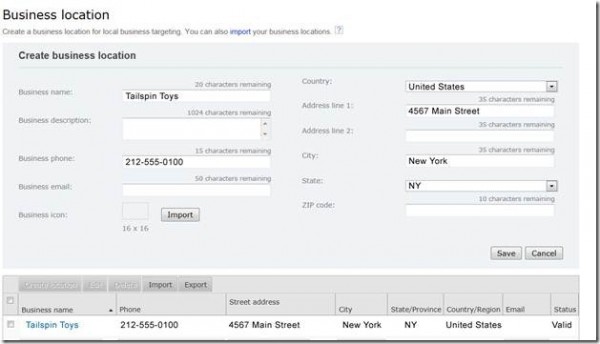Microsoft adCenter Launches Location Extensions In Ads
Microsoft has announced the launch of Location Extensions in adCenter, after mentioning plans for this, among other new features, nearly a year ago. The Location Extensions allow local business advertisers on Bing and Yahoo! search results to display their addresses and phone numbers within the ads, similar to the Location Extensions in Google AdWords. The interface […]
Microsoft has announced the launch of Location Extensions in adCenter, after mentioning plans for this, among other new features, nearly a year ago.
The Location Extensions allow local business advertisers on Bing and Yahoo! search results to display their addresses and phone numbers within the ads, similar to the Location Extensions in Google AdWords.
The interface for adding location extension information is pretty straightforward:
The Location Extensions are clearly part of the adCenter team’s intention to achieve feature parity with Google AdWords soon, as Eric Enge mentioned last month. One feature that differentiates Microsoft’s product a little from Google’s is the “Business icon” which only appears in association with the ads that are displayed on Yahoo!.
I spoke to the adCenter product managers (Shamit Patel, Peter Yang, Erin Zefkeles and Corinne Woodward) this week about the new features and they revealed a number of interesting details. The Location Extensions are unabashedly geared to make it easy for Google AdWords advertisers to copy ad campaigns into adCenter. Businesses such as nationwide department stores can upload up to one thousand locations at a time and associate them with an ad campaign.
I asked the team if they were concerned about whether the inclusion of additional information in the ads might detract from clickthrough interactions and reduce Microsoft’s revenues (since consumers could potentially just call phone numbers displayed and/or visit the store address in-person), and they stated that initial research indicated that would not be the case — display of the local information makes the ads appear more relevant to searchers, increasing clicks and overall engagement.
While the ads can be expected to increase calls and foot traffic to storefronts, they also increase CTR in testing. For anyone familiar with local online marketing, these findings are unsurprising and make it clear that there is likely to be some pent-up demand for location extensions for PPC ads appearing in Bing and Yahoo!.
A few other details:
- Microsoft doesn’t offer their own phone call tracking service, although advertisers are welcome to provision the ads using trackable numbers.
- Unlike Google’s Location Extensions, Microsoft doesn’t require the business listing to be drawn from Bing Business Portal. (From my perspective, this is actually a good thing, since Google’s requirement that location data be drawn from Google Places is less flexible and more restrictive.)
- Bing Business Portal profile pages can be set up as landing pages for these ads, if desired.
- Location Extensions currently will not show up on Bing/Yahoo syndicated search partner sites as of yet, but the adCenter team is evaluating other properties where the feature may appear sometime down the line.
The location extensions are a great addition for local search marketers, and will likely be advantageous for local companies to integrate as soon as possible, since they would likely result in more qualified clicks and store visits.
Shamit Patel reports that Microsoft intends to accelerate the rollout of more features, so I would expect more announcements from the adCenter team in the near future.
Opinions expressed in this article are those of the guest author and not necessarily Search Engine Land. Staff authors are listed here.
Related stories

